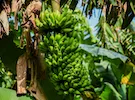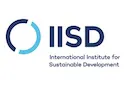Banana producers are increasingly using voluntary sustainability standards to tackle the sector’s sustainability challenges, including crop diseases, climate change impacts, excessive pesticide use, low farm-gate prices, and poor labor practices, according to a new report released by the International Institute for Sustainable Development.
 “With standards such as Rainforest Alliance, Organic, and Fairtrade, banana plantations are more likely to do things like fairly compensate workers and reduce pesticide use and water depletion,” says Vivek Voora, an author of the report and associate with IISD.
“With standards such as Rainforest Alliance, Organic, and Fairtrade, banana plantations are more likely to do things like fairly compensate workers and reduce pesticide use and water depletion,” says Vivek Voora, an author of the report and associate with IISD.
The report tracks the use of VSSs in the sector, which experienced a 43% compound annual growth rate from 2008 to 2016, compared to a 0.71% CAGR for conventional bananas. By 2016 at least 7% of global banana production was certified by a VSS, representing 36% of exported bananas.
“Consumers in North America and Europe are demanding healthier and more sustainable bananas in the marketplace,” Voora says. Unlike other commodity markets, VSS-compliant bananas tend to be sold as such, according to the report.
Overall banana consumption is estimated to reach 136 million tonnes by 2025, an increase of 20 million tonnes from 2017, driven by demand from producer countries in the developing world, where bananas are an important source of nutrition and food security. The Asia-Pacific region, which accounts for 61% of current demand, is expected to lead this growth.
Voora says the massive Asia-Pacific market has huge potential to move the sector towards sustainability if it develops demand for VSS-compliant bananas. “It’s critical for VSSs to become more accessible so smallholder producers can easily adopt the standards, and consumers in developing countries can afford to buy them.”
To read the full report, click here.
 For more information:
For more information:
International Institute for Sustainable Development
Tel: +1 (613) 238 2296 ext. 114
Email: media@iisd.org
www.iisd.org
